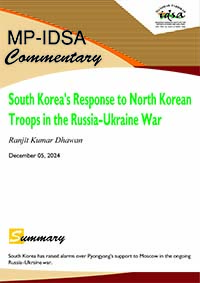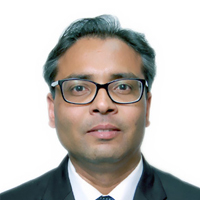South Korea’s Response to North Korean Troops in the Russia–Ukraine War
- December 05, 2024 |
- IDSA Comments
The Russia–Ukraine war since 2022 has a profound impact on the geopolitics of the East Asian region.1 Notably, it has strengthened the military alliance between Russia and North Korea. Russian President Vladimir Putin visited Pyongyang in June 2024 and signed a mutual defence treaty, the ‘Comprehensive Strategic Partnership’ with North Korean leader Kim Jong-un. This new agreement also calls for cooperation between the two countries in the fields of information technology, nuclear energy, space research and food production.2
The deepening military cooperation between Russia and North Korea is evident from the fact that thousands of North Korean troops are reported to have been currently deployed in Russia. According to the South Korean National Intelligence Service (NIS), North Korean soldiers have been possibly given the duty in the Marine Corps and/or in the airborne brigade of the Russian army.3 South Korea’s Defense Minister has argued that North Korean troops are being used as “cannon fodder” by the Russians.4 In October 2024, an estimated 8,000 North Korean soldiers were reported to have been stationed in the Kursk region of Russia.5 Notably, North Korean Foreign Minister Choe Son Hui has also pledged to support Russia until Moscow’s “victory” against Ukraine.6
The deepening military partnership between Russia and North Korea has increased apprehensions in the United States and South Korea. Ukraine has also raised concerns over the participation of North Korean soldiers in the ongoing war between Moscow and Kiev.7 In November 2024, Ukraine confirmed to have had first clashes with the North Korean soldiers.8 Earlier, the Ukrainian President Volodymyr Zelenskyy had requested Western allies to act against the North Korean troops in Russia.9 It was also reported that about 500 North Korean soldiers have apparently died in a Ukrainian attack in November 2024.10
Why has North Korea Sent its Troops to Russia?
North Korea has sent its troops to the war zone in Europe for both economic and geopolitical reasons. The severe economic sanctions imposed on North Korea by the international community has pushed the Kim dynasty regime to look for new sources of income. Exporting weapons and sending soldiers to fight for Russia has brought economic benefits to Pyongyang. The South Korean media reported that North Korea’s participation in the Russia–Ukraine war would benefit Pyongyang with food, money and sophisticated space technologies from Russia.11 The South Korean National Security Adviser has also claimed that North Korea received anti-air missiles from Russia for Pyongyang sending its soldiers to participate in the ongoing Russia–Ukraine war.12
There is also geopolitical context to the North Korean soldiers now operating in Russia. The North Korean regime was increasingly threatened by the trilateral security cooperation between the United States, South Korea and Japan. After the failure of North Korea’s engagement with various American administrations, Pyongyang has probably lost hopes of reconciliation with the United States.13 North Korea’s relationship with its closest ally, China, has also apparently soured in the recent years.14 Therefore, the deepening relationship with Russia provides Kim dynasty regime an important ally, which also has a permanent membership in the United Nations Security Council.
South Korea’s Response
South Korea has raised alarms over Pyongyang’s support to Moscow in the ongoing Russia–Ukraine war, calling it an “illegal” military alliance.15 The United States and South Korea have also agreed to “further expose” the ongoing military and technological collaboration between Moscow and Pyongyang.16 Also, in the first ever South Korea–Canada Foreign and Defense (2+2) Ministers’ Meeting, the two countries demanded the withdrawal of North Korean soldiers from Russia.17 At the Asia-Pacific Economic Cooperation (APEC) summit in Peru in November 2024, the United States, Japan and South Korea denounced the “dangerous” Russia–North Korea military alliance.18 On the sidelines of the APEC summit, the South Korean President Yoon Suk Yeol even urged Chinese President Xi Jinping to act against the North Korean military support to Russia.19
On the other hand, the demand for South Korea’s support and aid to Ukraine also increased in November 2024.20 A South Korean leader from the ruling party regarded the participation of North Korean troops in the Russia–Ukraine war as a “crime against humanity”.21 However, Seoul rejected the idea of sending its troops in support of Ukraine in the ongoing war.22 According to a survey reported in November 2024, the majority of South Koreans were also opposed to Seoul sending lethal weapons directly to Ukraine.23 Arguments are also being made in South Korea that the primary objective of the country should be to strengthen the national defence against North Korean threats, and not to send weapons to Ukraine.24
Donald Trump’s electoral victory in November 2024 has increased anxieties in South Korea.25 Although Seoul is apprehensive about Trump’s ‘transactional approach’, he has pledged to stop the Russia–Ukraine war. As an ally of the United States, South Korean President Yoon Suk Yeol has also expressed his desire to cooperate with the incoming Trump administration.26 Therefore, South Korea’s probable response to the ongoing conflict in Europe has been to ‘wait and watch’. Evidently, despite meeting the Ukrainian delegation led by Kyiv’s Defense Minister Rustem Umerov in Seoul in November 2024, South Korean government’s response regarding the provision of arms directly to Ukraine has remained muted.27
Conclusion
North Korea’s participation in the ongoing war between Moscow and Kyiv through sending soldiers and weapons to Russia in return for military-technological support can further disturb the balance of power between the two Korean states and could trigger a new arms race on the Korean Peninsula. South Korea’s response to the participation of North Korean troops in the Russia–Ukraine war has been calculated. Seoul has refrained from providing lethal weapons directly to Ukraine. The public opinion in South Korea has also been against sending weapons to Ukraine. The South Korean government’s next moves will depend on the policies of the Donald Trump administration as regards the Russia–Ukraine war.
Views expressed are of the author and do not necessarily reflect the views of the Manohar Parrikar IDSA or of the Government of India.
- 1. [i] Kyunghan Lim and Jaeho Kim, “Impacts of Russia-Ukraine War on East Asian Regional Order”, International Journal of Korean Unification Studies, Vol. 31, No. 2, 2022, pp. 31–59.
- 2. “DPRK-Russia Treaty on Comprehensive Strategic Partnership”, KCNA, 20 June 2024.
- 3. Yonhap, “NK Troops Assigned to Russia’s Airborne Brigade, Marine Corps; Some Entered Combat: NIS”, The Korea Times, 20 November 2024.
- 4. Seo Ji-eun, “North Korean Troops Deployed to Russian Military Units As ‘Cannon Fodder,’ Says South’s Defense Chief”, Korea JoongAng Daily, 28 November 2024.
- 5. Yonhap, “Some 8,000 N. Korean Troops in Russia’s Kursk Region, Expected to Enter Combat in ‘Coming Days’: Blinken”, The Korea Herald, 1 November 2024.
- 6. “North Korea Pledges to Stand by Russia Until ‘Victory’ in Ukraine”, Al Jazeera, 1 November 2024.
- 7. “Zelenskyy Accuses North Korea of Sending Soldiers to Help Russia in War”, Al Jazeera, 14 October 2024.
- 8. Yonhap, “Ukraine’s Zelenskyy Confirms First Combat Engagement with N. Korean Troops”, The Korea Times, 6 November 2024.
- 9. “Ukraine’s Zelenskyy Urges Allies to Act before N Korean Troops Reach Front”, Al Jazeera, 2 November 2024.
- 10. Yonhap, “Ukrainian Media Reports 500 N. Korean Soldiers Killed in Kyiv’s Missile Strike on Kursk”, The Korea Times, 24 November 2024.
- 11. Kim Arin, “$200m A Year, 700,000 Tons of Rice, Space Tech: The Deal for North Korea in Joining Russia’s War”, The Korea Herald, 3 November 2024.
- 12. Yonhap, “Russia Provided NK with Anti-Air Missiles in Exchange for Troop Deployment: Seoul’s Top Security Adviser”, The Korea Times, 22 November 2024.
- 13. Seo Ji-Eun, “North Vows to Strengthen Nuclear Arsenal Regardless of U.S. Election Results”, Korea JoongAng Daily, 5 August 2024.
- 14. Yonhap, “NIS Closely Watching NK-China Ties Amid Signs of Rift”, The Korea Times, 31 July 2024.
- 15. Yonhap, “Yoon Calls for Thorough Countermeasures against ‘Illegal’ N. Korea-Russia Military Cooperation”, The Korea Times, 4 November 2024.
- 16. Yonhap, “S. Korea, US Agree to ‘Further Expose’ Russia’s Support to N. Korea amid NK Troop Deployment”, The Korea Times, 1 November 2024.
- 17. Yonhap, “S. Korea, Canada Demand Withdrawal of N. Korean Troops From Russia”, The Korea Herald, 2 November 2024.
- 18. “US, South Korea and Japan Slam ‘Dangerous’ Ties between Russia, North Korea”, Al Jazeera, 16 November 2024.
- 19. Yonhap, “Yoon Asks China’s Xi to Play ‘Constructive’ Role in NK’s Provocation, Military Cooperation with Russia”, The Korea Times, 16 November 2024.
- 20. Park Hyun-ju and Cho Jung-woo, “Calls Are Growing for Korea to Aid Ukraine. Experts Say It Should Wait”, Korea JoongAng Daily, 1 November 2024.
- 21. Kim Arin, “Ruling Party Leader Condemns North Korea Troop Dispatch As Crime Against Humanity”, The Korea Herald, 4 November 2024.
- 22. Yonhap, “S. Korea Not Considering Troop Dispatch to Ukraine: Nat’l Security Adviser”, The Korea Herald, 1 November 2024.
- 23. Kim Jeong-jae, Oh Hyun-seok and Cho Jung-woo, “Two-Thirds of Koreans Oppose Sending Weapons to Ukraine, Poll Suggests”, Korea JoongAng Daily, 4 November 2024.
- 24. “Don’t Rush To Weapons of Mass Destruction”, Korea JoongAng Daily, 28 November 2024.
- 25. Lee Hyo-jin, “Rocky Road Ahead for S. Korea-US Alliance as Trump Returns to White House”, The Korea Times, 7 November 2024.
- 26. Sarah Kim, “Yoon, Trump Discuss Alliance, Economic Cooperation, North Korea in First Phone Call”, Korea JoongAng Daily, 7 November 2024.
- 27. Hyung-Jin Kim, “South Korean Leader Meets Ukraine Delegation and Calls for Response to North Korean Troops in Russia”, The Associated Press, 27 November 2024.






